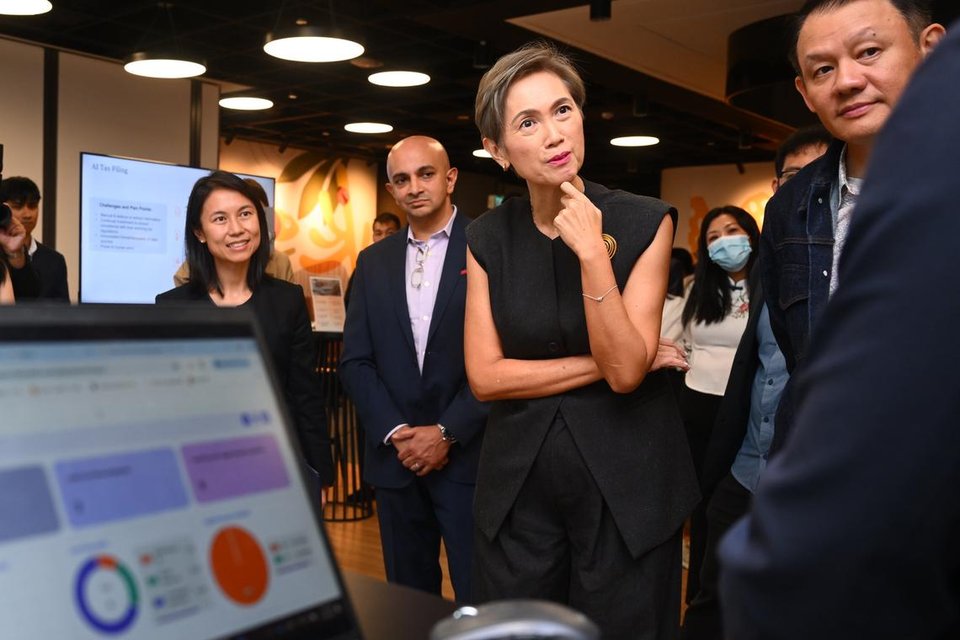New government review committee in talks with firms to broaden and deepen AI adoption

(Photo credit: ST Photo/Azmi Athni)
Source: The Straits Times
A new government committee set up to harness technology to drive economic growth has begun talking to businesses here on how artificial intelligence (AI) use can be broadened and deepened.
Such talks will help to ascertain the critical mass of AI users that Singapore needs to cultivate to turbocharge the entire business ecosystem, Minister for Digital Development and Information Josephine Teo said on Aug 11.
“One of the areas that I believe the review committee will specifically look at is how AI adoption can be broadened and deepened,” she said, during a visit to professional services firm PwC’s AI Hub at Marina One on Aug 11.
“And what that means is how many companies (are needed) in order for us to get that critical mass for the ecosystem to be turbocharged.”
The Committee on Technology and Innovation is one of five committees under the Economic Strategy Review announced by Deputy Prime Minister Gan Kim Yong on Aug 4 to chart a forward-looking blueprint to secure quality opportunities for Singapore businesses and workers.
The review is part of the Singapore Economic Resilience Taskforce (SERT), formed earlier in 2025 to help affected businesses and workers navigate uncertainties sparked by US tariffs on Singapore goods.
The Committee on Technology and Innovation – led by Ms Jasmin Lau, Minister of State for Education and Digital Development and Information, and Ms Goh Hanyan, Senior Parliamentary Secretary for Culture, Community and Youth, and Sustainability and the Environment – will also look at the number of people gaining fluency in and being meaningful users of AI in their specific domains, Mrs Teo said.
“One very important question is: Are there skills that the broader workforce will be able to acquire to become even more future-ready than they are today?
“So, I think the specific target, the specific areas of work (the committee) will certainly look at (is) the number of companies that will adopt AI meaningfully,” she said, adding that the committee will also look at expanding the pool of AI practitioners.
When asked about concerns people may have of AI affecting jobs, Mrs Teo said that based on her observations during company visits, it is people with AI skills who are more likely to edge out those without them, rather than AI replacing workers.
She said businesses that integrate AI applications into the way they work are more likely to be able to serve their customers better and improve their productivity and bottom line.
“When you think about the fact that the economy is made up of enterprises, then the national-level competition is also quite clear... A country that is able to adopt AI in a broader and deeper manner stands a better chance of providing its citizens with more opportunities for growth in their work lives,” she said.
Mrs Teo, who co-leads one of the SERT work streams focused on establishing regular communication between the Government, businesses and workers, noted that the work of the Committee on Technology and Innovation builds on existing initiatives such as Smart Nation 2.0 and the National AI Strategy.
During their Aug 11 visit to PwC’s AI Hub – which opened in January – Mrs Teo and Ms Goh observed how AI technologies are used in areas such as shipping operations and tax filing.
Ms Goh, who was previously a director in the Smart Nation Strategy Office and the national AI group for policy and strategy at the Ministry of Digital Development and Information before joining politics, said the benefits of technology cannot just be for those with resources, but for a broad swathe of businesses, both big and small.
“It is important for us to meet the companies where they are, what their different contexts are, what their pain points are, and figure out ways to support them,” she said.
Noting that companies with more resources have the potential to develop in-house solutions, Ms Goh said smaller firms could be given access to ready-made and affordable solutions.
She added that strategies for helping these firms with AI can be adapted from past initiatives such as SMEs Go Digital, which encourages such companies to adopt digital solutions and technologies to enhance their capabilities.
